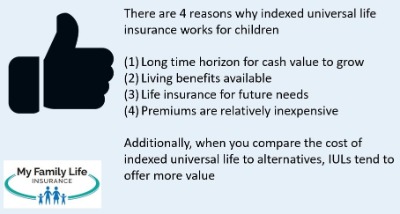All Categories
Featured
Table of Contents
Do they contrast the IUL to something like the Vanguard Total Supply Market Fund Admiral Shares with no lots, an expenditure ratio (EMERGENCY ROOM) of 5 basis factors, a turnover proportion of 4.3%, and an exceptional tax-efficient record of circulations? No, they compare it to some dreadful proactively taken care of fund with an 8% lots, a 2% EMERGENCY ROOM, an 80% turnover ratio, and a dreadful record of temporary resources gain distributions.
Mutual funds usually make annual taxed distributions to fund proprietors, even when the worth of their fund has actually decreased in value. Mutual funds not just need revenue coverage (and the resulting yearly taxes) when the shared fund is increasing in worth, but can also enforce income tax obligations in a year when the fund has actually decreased in value.
That's not how shared funds work. You can tax-manage the fund, gathering losses and gains in order to decrease taxed distributions to the investors, but that isn't somehow mosting likely to change the reported return of the fund. Just Bernie Madoff kinds can do that. IULs prevent myriad tax obligation traps. The possession of mutual funds may call for the mutual fund proprietor to pay projected taxes.

IULs are simple to position to make sure that, at the proprietor's death, the beneficiary is not subject to either earnings or estate tax obligations. The very same tax decrease methods do not work almost also with mutual funds. There are many, typically costly, tax obligation traps connected with the moment buying and selling of mutual fund shares, traps that do not relate to indexed life insurance policy.
Possibilities aren't extremely high that you're mosting likely to go through the AMT because of your mutual fund circulations if you aren't without them. The remainder of this one is half-truths at finest. While it is true that there is no earnings tax due to your beneficiaries when they inherit the earnings of your IUL plan, it is likewise true that there is no earnings tax obligation due to your heirs when they inherit a common fund in a taxed account from you.
Universal Vs Term Life
The federal estate tax obligation exception limitation is over $10 Million for a couple, and growing annually with inflation. It's a non-issue for the large majority of doctors, a lot less the remainder of America. There are better means to avoid estate tax problems than buying investments with reduced returns. Common funds may create earnings taxation of Social Safety benefits.

The growth within the IUL is tax-deferred and might be taken as free of tax income using loans. The plan proprietor (vs. the mutual fund manager) is in control of his or her reportable earnings, hence enabling them to lower and even eliminate the tax of their Social Safety and security benefits. This set is terrific.
Below's an additional marginal concern. It's real if you get a mutual fund for claim $10 per share right before the circulation date, and it disperses a $0.50 distribution, you are after that mosting likely to owe tax obligations (possibly 7-10 cents per share) regardless of the fact that you have not yet had any gains.
Yet in the long run, it's actually regarding the after-tax return, not how much you pay in taxes. You are mosting likely to pay more in tax obligations by utilizing a taxed account than if you buy life insurance coverage. Yet you're likewise probably mosting likely to have even more cash after paying those taxes. The record-keeping demands for having shared funds are significantly more complicated.
With an IUL, one's records are maintained by the insurance provider, duplicates of annual declarations are mailed to the proprietor, and circulations (if any type of) are amounted to and reported at year end. This set is additionally sort of silly. Naturally you ought to keep your tax obligation records in case of an audit.
Iul For Dummies
All you need to do is push the paper right into your tax folder when it turns up in the mail. Rarely a reason to purchase life insurance policy. It resembles this individual has never purchased a taxed account or something. Shared funds are commonly part of a decedent's probated estate.
In enhancement, they are subject to the hold-ups and costs of probate. The earnings of the IUL policy, on the various other hand, is always a non-probate distribution that passes beyond probate straight to one's named beneficiaries, and is for that reason not subject to one's posthumous creditors, unwanted public disclosure, or comparable hold-ups and expenses.
Medicaid disqualification and life time income. An IUL can supply their proprietors with a stream of revenue for their whole life time, regardless of how long they live.

This is advantageous when organizing one's affairs, and converting possessions to earnings prior to an assisted living facility arrest. Mutual funds can not be converted in a similar way, and are often taken into consideration countable Medicaid possessions. This is another dumb one promoting that bad individuals (you understand, the ones who need Medicaid, a federal government program for the inadequate, to pay for their retirement home) ought to make use of IUL as opposed to mutual funds.
Variable Universal Life Insurance Calculator
And life insurance policy looks awful when contrasted rather versus a pension. Second, individuals that have cash to buy IUL above and beyond their pension are mosting likely to have to be dreadful at managing cash in order to ever receive Medicaid to spend for their assisted living home costs.
Chronic and incurable ailment motorcyclist. All policies will allow an owner's simple access to cash from their policy, usually forgoing any abandonment penalties when such individuals suffer a major illness, need at-home care, or come to be confined to an assisted living facility. Mutual funds do not offer a comparable waiver when contingent deferred sales charges still apply to a shared fund account whose owner needs to offer some shares to fund the prices of such a remain.
Equity Indexed Whole Life Policy
You get to pay more for that benefit (cyclist) with an insurance plan. What an excellent offer! Indexed global life insurance coverage offers fatality benefits to the beneficiaries of the IUL proprietors, and neither the owner nor the recipient can ever before lose cash because of a down market. Shared funds offer no such warranties or death advantages of any type of kind.
Currently, ask yourself, do you actually require or desire a survivor benefit? I certainly do not need one after I reach monetary freedom. Do I want one? I intend if it were affordable sufficient. Naturally, it isn't cheap. On standard, a purchaser of life insurance policy spends for the true price of the life insurance policy benefit, plus the prices of the plan, plus the revenues of the insurance provider.
Universal Life Company
I'm not totally certain why Mr. Morais included the entire "you can't shed money" again here as it was covered quite well in # 1. He simply wished to duplicate the most effective selling point for these points I intend. Again, you don't shed small bucks, but you can shed genuine dollars, along with face significant chance price as a result of low returns.

An indexed global life insurance coverage plan owner may exchange their policy for a totally different plan without setting off earnings tax obligations. A mutual fund proprietor can not move funds from one shared fund business to an additional without offering his shares at the former (thus triggering a taxed event), and buying new shares at the latter, commonly based on sales costs at both.
While it holds true that you can trade one insurance coverage for one more, the factor that people do this is that the very first one is such a dreadful policy that even after acquiring a brand-new one and experiencing the very early, adverse return years, you'll still appear in advance. If they were marketed the best policy the very first time, they shouldn't have any kind of desire to ever trade it and undergo the very early, adverse return years again.
Latest Posts
Insurance Indexation
Indexed Death Benefit
Variable Universal Life Vs Indexed Universal Life